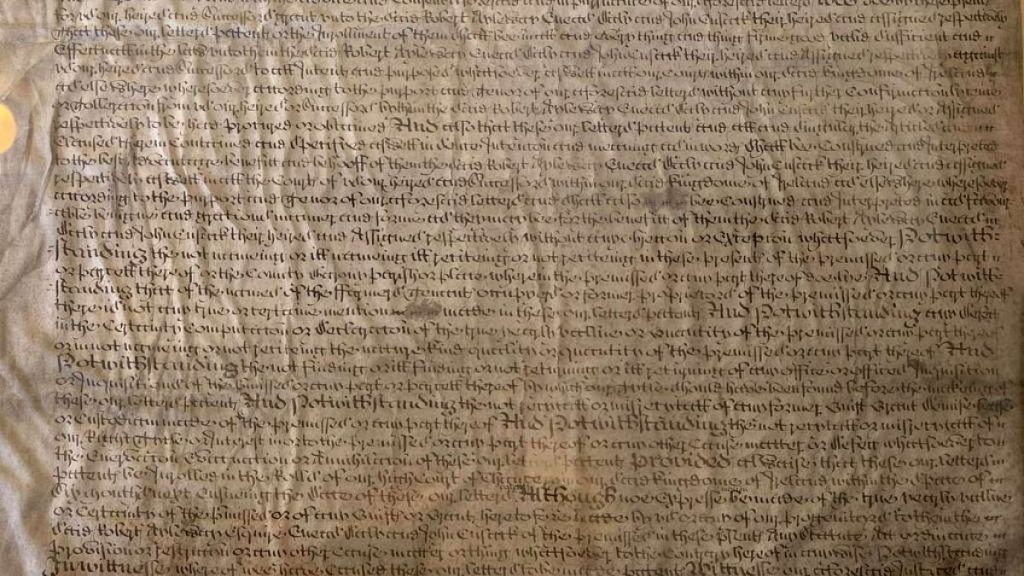The Public Records Office of Northern Ireland (PRONI) has embarked on a meticulous conservation project to restore and preserve the 650-year-old ecclesiastical register of Milo Sweteman, Archbishop of Armagh from 1361 to 1380. This delicate undertaking forms part of a larger initiative to safeguard Ireland’s invaluable medieval archives and make them accessible to future generations. The Sweteman register, a rare example of pre-1450 paper documents in Ireland, offers a unique window into the ecclesiastical practices and administrative workings of the 14th century. Its pages contain a diverse collection of drafts, legal documents, correspondence, receipts, and wills, providing invaluable insights into the period. The project underscores the significance of preserving primary historical sources, allowing researchers and the public to connect with their past and understand the foundations of their present.
The scarcity of paper documents from this era in Ireland makes the Sweteman register an exceptionally precious artifact. Research suggests the paper used in the register likely originated from Italy and Spain, regions frequented by archbishops of the time. This insight, gleaned from studying the document’s watermarks, illuminates the intricate trade routes and paper production of medieval Europe. The register’s survival highlights the importance of ongoing conservation efforts to protect such fragile remnants of history from further deterioration and ensure their continued availability for study and appreciation. The project not only preserves the physical document but also contributes to a broader understanding of medieval trade and cultural exchange.
The restoration of the Sweteman register follows the successful conservation of the register of Archbishop John Swayne, which dates from 1418 to 1438. The Swayne register has been digitized and a translated summary made available online, showcasing the benefits of these preservation efforts. Both projects are integral to the Virtual Record Treasury of Ireland, a national endeavor to reconstruct the country’s historical archive, which suffered devastating losses during a fire in 1922 amidst the Irish Civil War. This virtual treasury aims to provide a digital repository for Ireland’s historical records, ensuring their accessibility and safeguarding them against future physical damage or loss. The digitization and translation efforts also broaden access to these historical resources for a wider audience, including researchers and the public internationally.
The conservation of the Sweteman register involves a delicate and painstaking process. The document had previously undergone restoration efforts in the early 20th century, which unfortunately involved the use of acidic tracing paper. This well-intentioned but ultimately damaging intervention accelerated the degradation of the register’s pages. The current conservation team at PRONI is meticulously removing the acidic tracing paper using a specialized gel. This careful removal process minimizes further damage to the fragile folios. Following the removal of the tracing paper, each folio is gently washed and any tears are repaired using Japanese kozo paper and wheat starch paste. These materials are chosen for their compatibility with the original document and their ability to provide long-term stability.
The intricate restoration process reflects the commitment of PRONI to preserving these irreplaceable historical documents for future generations. Head of Conservation Sarah Graham emphasizes the importance of stabilizing these collections, making them accessible to the public today while also ensuring their preservation for future research and appreciation. By painstakingly repairing the damage and stabilizing the fragile pages, the team is not only preserving the physical document but also ensuring the continued accessibility of the historical information it contains. This dedication to preserving the past allows future generations to connect with their heritage and gain a deeper understanding of the historical forces that have shaped their present.
The conservation of the Sweteman register highlights the broader significance of archival preservation in understanding historical narratives. These documents offer invaluable insights into the past, allowing researchers to reconstruct historical events, social structures, and even individual lives. By preserving these primary sources, PRONI is safeguarding a tangible link to Ireland’s rich history. The painstaking restoration work ensures that these fragile remnants of the past continue to inform and inspire, contributing to a deeper understanding of Ireland’s cultural heritage for generations to come. The project exemplifies the importance of continued investment in archival preservation and the vital role these institutions play in safeguarding the historical record.














